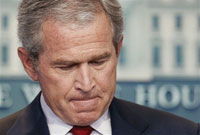Bush acknowledges America and himself tired of war in Iraq
George W. Bush finally stated that the strategy of his administration in Iraq had brought little success. However, the US president added that he was not going to change the current strategy before September of the current year, when the Pentagon releases a new report on Iraq. To crown it all, Bush said that the American society and himself were tired of the war in Iraq.

Speaking to reporters at a special press conference, the US president said that the next report to the Congress may become a crucial one in which he would probably considers an opportunity of a different decision. For the time being, Bush continued, it was too early to make a new fundamental decision because the new strategy in Iraq has not been able to prove its effectiveness.
"We'll also have a clearer picture of how the new strategy is unfolding, and be in a better position to judge where we need to make any adjustments," Bush said.
In September General David Petraeus, the Commander of US troops in Iraq, will submit his report to the Congress. Shortly before that George W. Bush will send US Secretary of State Condoleezza Rice and Defense Secretary Robert Gates to the Middle East, including Iraq. The two officials will reportedly set off for the trip in August.
In spite of the fact that George W. Bush has acknowledged the wrong strategy of the USA in Iraq, the head of state urged US citizens to show more patience on the matter. "Those who believe that the battle in Iraq is lost will likely point to the unsatisfactory performance on some of the political benchmarks. But he added: "Those of us who believe the battle in Iraq can and must be won see the satisfactory performance on several of the security benchmarks as a cause for optimism."
The report was blunt at points and more opaque at others.
While Iraq has begun to show progress in providing services, "citizens nationwide complain about government corruption and the lack of essential services, such as electricity, fuel supply, sewer, water, health and sanitation."
At another point, it added, "The prerequisites for a successful militia disarmament program are not present."
In addition to citing a Syrian connection for terrorists, it also said Iran has continued to foster instability in Iraq.
It cited measured progress on the economic front. "Unemployment has eased slightly and inflation is currently abating," the report said. It omitted mention of a June 1 Pentagon report estimating an annual inflation rate at 33 percent and the Iraqi government estimate of joblessness at 17 percent, the AP reports.
In an evident jab at critics of Bush's war policies, the report also said progress toward political reconciliation was hampered by "increasing concern among Iraqi political leaders that the United States may not have a long term-commitment to Iraq."
Despite rising pressure from Republicans in Congress for a change in course, Bush was adamant.
"When we start drawing down our forces in Iraq, it will (be) because our military commanders say the conditions on the ground are right, not because pollsters say it'll be good politics," he said.
Before Thursday's House vote, Republican aides said they hoped to suffer only a few party defections, but the administration faced a more volatile situation in the Senate. There, three Republicans have already said they intend to vote for a separate withdrawal measure, and several others have signed on as supporters of a bipartisan bill to implement a series of changes recommended last winter by the bipartisan Iraq Study Group.
Source: agencies
Subscribe to Pravda.Ru Telegram channel, Facebook, RSS!





